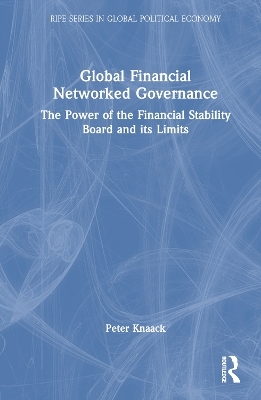
Global Financial Networked Governance
Routledge (Verlag)
978-1-032-26805-7 (ISBN)
The FSB’s track record in coordinating global financial regulatory reform is uneven. Some items on its agenda have seen the rapid evolution of globally coordinated regulatory standards and their implementation by all member states, sometimes even ahead of the stipulated timelines. In contrast, other initiatives have stalled at different stages of the policymaking process, global coordination is lacking, deadlines have been missed, and it is currently unclear when the post-crisis financial reform project will come to completion, if ever. In this book, the author asks the question: why has the FSB succeeded in some areas of its global financial regulatory coordination work and not in others? The book traces the global policymaking process in three major issue areas: banking regulation (Basel III), over-the-counter (OTC) derivatives, and ending too-big-to-fail. Through a combination of careful process tracing and rigorous testing against alternative explanations, it challenges the existing literature by revealing that the institutional pathway of policymaking is the main predictor of FSB progress. It shows that government networks on their own have succeeded in implementing globally coherent safety standards. In contrast, legislation and legislators in key G20 countries have limited the power and effectiveness of the FSB. The author analyzes the causes and effects of this phenomenon and suggests a novel institutional solution to the effectiveness-legitimacy dilemma that global governance forums face, combining the advantages of functional specialization and electoral accountability.
This book will be of great interest to graduate students; academics working at the intersection of economics, political science, and international law; students of the FSB in particular; and policymakers in global economic governance.
Peter Knaack is an Adjunct Professorial Lecturer at the School of International Service at American University, in Washington, DC, USA. He also serves as a senior research fellow at the Global Economic Governance Programme at the University of Oxford, UK; as a research associate at the Centre for Sustainable Finance at SOAS University of London, UK; and an associate at the Council on Economic Policies, a Swiss think tank. His research focuses on global financial governance. He has written and published on the political economy of global financial standard-setting, digital financial inclusion, green finance, and China’s financial system.
1. The Financial Stability Board – A Mixed Track Record at the Center of Global Financial Governance 2. The Power of a Government Network – and its Limits 3. Timely Implementation and Mock Compliance with Basel III 4. OTC Derivatives 5. The Never-Ending Too-Big-To-Fail Story 6. Effectiveness and Legitimacy of Government Networks
| Erscheinungsdatum | 06.08.2022 |
|---|---|
| Reihe/Serie | RIPE Series in Global Political Economy |
| Zusatzinfo | 4 Tables, black and white; 8 Line drawings, black and white; 9 Halftones, black and white; 17 Illustrations, black and white |
| Verlagsort | London |
| Sprache | englisch |
| Maße | 156 x 234 mm |
| Gewicht | 444 g |
| Themenwelt | Recht / Steuern ► Allgemeines / Lexika |
| Recht / Steuern ► EU / Internationales Recht | |
| Sozialwissenschaften ► Politik / Verwaltung | |
| Wirtschaft ► Volkswirtschaftslehre ► Wirtschaftspolitik | |
| ISBN-10 | 1-032-26805-0 / 1032268050 |
| ISBN-13 | 978-1-032-26805-7 / 9781032268057 |
| Zustand | Neuware |
| Informationen gemäß Produktsicherheitsverordnung (GPSR) | |
| Haben Sie eine Frage zum Produkt? |
aus dem Bereich


